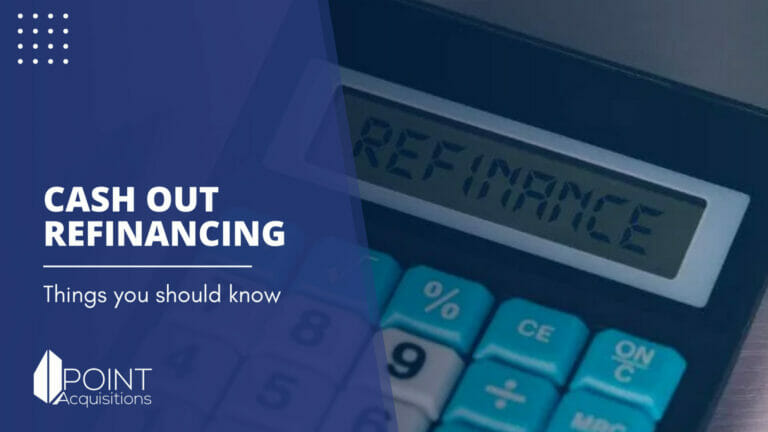
Commercial Cash-Out Refinance
Commercial cash-out refinancing offers a highly practical solution for consolidating existing debts and accessing the valuable cash stored within your property. It provides a remarkable opportunity to obtain liquid assets that can be utilized for essential purposes like property renovations, monthly payment reductions, or even expanding your commercial property portfolio.
The primary objective of this blog is to provide invaluable insights into the world of commercial cash-out refinancing. By explaining its potential benefits and offering guidance, this blog aims to assist you in making an informed decision about whether refinancing is the ideal path for you.

Table of Contents
What Is a Commercial Cash-Out Refinance?
A commercial cash-out refinance is defined as a financial transaction in which a commercial property owner replaces their existing mortgage with a new loan that surpasses the current outstanding balance.
Refinancing typically occurs when property owners seize the opportunity to benefit from favorable conditions, such as lower interest rates or enhanced market value. The primary goal of the refinance is to unlock the accumulated equity in the property, leading to a well-deserved cash payout.
How Does it Work?
Imagine there’s a business owner who is the proprietor of a store. The owner took a loan of $200,000 to buy the store, and over time, the store’s value increased.
The loan balance is $150,000 after a few years of paying back the mortgage, and the store is worth $300,000.
The owner wants more money to expand the business, so they do a commercial cash-out refinance. They apply for a new loan based on the increased value of the store.
The lender approves the application and gives the owner a new loan for $240,000 (80% of the current store value), which includes the remaining $150,000 balance, which is paid back, and an extra $90,000 in cash. The owner can use this cash for whichever purposes they desire.
The owner now has to make monthly payments on the new loan based on the agreed terms with the lender.
In summary, The owner used a commercial cash-out refinance to get extra money by borrowing against the increased value of the store.

What Are the Requirements for A Commercial Cash-Out Refinance?
The requirements for commercial cash-out refinancing can vary based on the lender and borrower’s unique situation. Lenders conduct property appraisals and typically consider a Loan-to-Value (LTV) ratio of approximately 70-80% of the property value, ensuring a healthy equity position of 20-30% in the property.
Credit history verification assesses the borrower’s ability to repay the loan. A strong credit score enhances the likelihood of loan approval and opens doors to more favorable terms.
Lenders also evaluate the borrower’s capacity to generate ample cash flow, often measured through the Debt Service Coverage Ratio (DSCR), ensuring the ability to meet repayment obligations comfortably.
Additional requirements may exist depending on individual circumstances. Therefore, we recommend that potential borrowers consult with a lender or mortgage professional to gain a precise understanding of their specific needs and requirements. To fully understand the requirements, you can check out the following presentation by the Small Business Association (SBA).
What Are the Benefits of A Commercial Cash-Out Refinance?
You may get a commercial cash-out refinance for several excellent benefits and reasons.
People often opt to refinance with the primary goal of reducing their monthly payments. The reduction can be achieved by obtaining a new mortgage with a lower interest rate than their existing loan.
Adjusting the loan repayment term or type of loan can offer advantages for commercial real estate owners. For instance, refinancing from an adjustable to a fixed-rate loan can bring greater payment stability, especially when interest rates rise.
You can borrow more than your current loan balance through a cash-out refinance on a commercial property loan. Receiving the cash difference between the two loan amounts can be a life-changer! Numerous commercial real estate investors utilize this cash to make valuable improvements to their property or acquire new investment properties, expanding their portfolio and enhancing their potential for success.

Choosing A Lender
Commercial real estate refinance options are readily available from various reputable financial institutions. Established entities such as the SBA, national banks, online lenders, and credit unions provide avenues for refinancing commercial property loans. The SBA 504 refinance loan program is reliable as it offers below-market fixed rates for refinancing existing 504 loans. It is important to note that lenders offering SBA loans must first gain approval to offer such financing.
There are several important factors to ask when speaking with prospective lenders. An array of fees and costs await anybody seeking a commercial cash-out refinance, so it is essential to be well-prepared and aware of competitive prices among the options.
It is recommended to check the following:
- Origination fee
- Application fee
- Appraisal fee
- Credit check fee
- Guaranty fee
- Prepayment penalty
- Contractual obligations
What are the Risks and Considerations of Commercial Cash-Out Refinancing?
Taking a risk is part of the commercial real estate game; however, that does not mean you should ignore them!
It’s important to exercise caution when considering commercial cash-out refinancing as it involves taking on additional debt by borrowing a larger loan amount. This could increase your overall financial obligations, which strain your cash flow and impact your ability to meet future payment obligations.
Should the property’s value decline or if the market experiences fluctuations, it could impact your equity position and undermine the anticipated benefits of the refinance.
A careful evaluation of your financial situation and a thorough assessment of the potential risks and impacts on your financial stability is crucial before proceeding with a commercial cash-out refinance.

Frequently Asked Questions
Is It Possible to Refinance a Commercial Property Without an Appraisal?
No, it is not possible to refinance a commercial property without an appraisal. Unlike residential mortgage loans, where certain government-backed options allow for bypassing the appraisal requirement, commercial real estate loans do not offer such alternatives. For commercial loans secured by collateral, an appraisal is mandatory for SBA loans exceeding $500,000 and USDA loans. These appraisals ensure proper valuation and risk assessment for the lenders.
Who Can Refinance Commercial Property?
Any bank can refinance commercial property loans. Various lenders, including the Small Business Administration (SBA) and the United States Department of Agriculture (USDA), national banks, online lenders, and credit unions, provide options for refinancing commercial property. However, the respective agencies must approve lenders offering SBA or USDA loans.
Who Should Consider a Commercial Refinance?
Individuals and businesses possessing commercial real estate should contemplate refinancing under certain circumstances. This includes situations where there is potential for securing a more favorable interest rate, the need to modify loan terms, or the desire to capitalize on the accumulated equity in the property. These factors can help determine whether a refinance is a suitable action.
About The Author

Jesse Shemesh
Disclaimer
Please note that Point Acquisitions is not a tax expert or tax advisor. The information on our blogs and pages is for general informational purposes only and should not be relied upon as legal, tax, or accounting advice. Any information provided does not constitute professional advice or create an attorney-client or any other professional relationship. We recommend that you consult with your tax advisor or seek professional advice before making any decisions based on the information provided on our blogs and pages. Point Acquisitions is not responsible for any actions taken based on the information provided on our blogs and pages.
1031 Exchange Capital Gains Tax Deferral
According to a 2021 report by the National Real Estate Exchange Services (RES), over 240,000 1031 exchange transactions were completed in the United States, totaling $100 billion. This impressive figure underscores the role of 1031 exchanges in the real estate…
Read More1031 Exchange Benefits
As of Q4 2023, the national vacancy rate for all commercial property types in the United States sat at 9.2%, according to CBRE’s latest insights and research. This represents a slight decrease compared to the previous quarter and suggests a…
Read More1031 Exchange Legal Considerations: A Must-Read Guide
You’re in the right place if you’re considering a 1031 exchange for your commercial real estate investments. Whether you’re a seasoned investor or just dipping your toes into the market, understanding the legal landscape of 1031 exchanges is key to…
Read More

